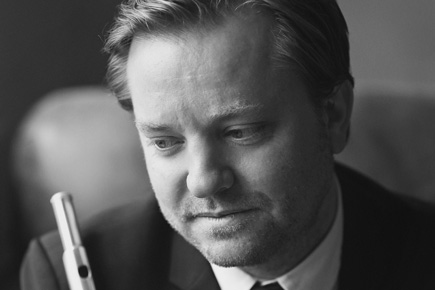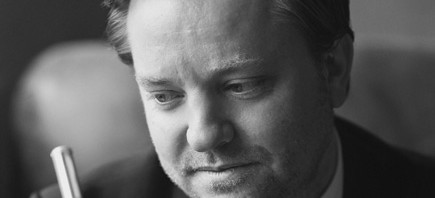
The following interview with London Symphony Orchestra Principal Flute Gareth Davies interview was originally posted on Principal Chairs. He talks about everything from the LSO to auditions, colleagues in the orchestra, preparing for auditions, his Royal College of Music teaching appointment and his new book about the LSO on tour.
Hi Gareth! Thanks for coming to chat with us. As a lot of our subscribers are recent graduates could you tell us what you found to be the challenges in bridging the gap between college and professional work?
Well when you start at college it’s difficult to know what’s expected of you in the workplace. You’re obsessed with all the things you have to get right like exams, and other things, and you compare yourself with other flute players around you. It was quite an eye-opener when I went out and did a bit of freelance work. It is difficult to pick up your first date, but I remember turning up for an audition as a rookie student flute player and in the same room as me were three well-known, established flute players, all warming up about to audition before me. That’s when I realised that one can be the best flute player in the college, but when you’re out you’re judged against every other flute player and that’s a quite big leap to make.
So how did the audition go?
I got the job! It just depends; if there was a job going in the London Symphony Orchestra then you know that a lot of other principals would be going for that. Having said that, there is always room for somebody else. I mean, take Adam Walker for example; he was 21 when he got the job [co-principal LSO] and of course there were other excellent flute players going for that seat. If you don’t get the job in one orchestra it doesn’t mean that you won’t somewhere else. All orchestras have a different style of playing. There is no right and wrong way of approaching this kind of thing.
What aspects of your job do you feel college couldn’t prepare you for?
I was at the Guildhall, but it has changed a lot since then! At the time I played in lots of repertoire sessions with just the wind, which were really useful, but we did very few concerts. For instance, I played second in Symphony Orchestra in a concert and that’s all I did in the entire time. The concert we did was Messiaen’s Turangalila Symphony. It has taken me almost 20 years to come up against that piece again and it took it off!
It’s interesting that what college didn’t prepare me for is the repertoire. The dream is to come out of college and get a job in the Berlin Phil, LSO, LPO etc., but the reality is that most people will come out and start doing small shows, local orchestras and dates in muddy fields playing the 1812 Overture. The Overture is really hard! Certainly when I was at college no one ever told me that.
Actually, one thing I really try to work on with colleges (since I have been in the LSO) is doing rep. sessions on standard repertoire that you are likely to actually play in real life. The first time I played in the LSO I had to sit down and virtually sight-read. Martin Parry, who was second flute then, had broken his ankle and I had substitute. It was Mahler 2 and I had to learn it pretty quickly. I got the score, looked at it and relied on my nerves for the concert. I felt that the college really did not prepare me for that. To be fair, there is no way it could have prepared me for that situation.
Usually you prepare for weeks for a concert and you practice for hours. I simply do not have the time for that now. I would be lucky if I could look at the music we’re playing in the next concert for an hour. You have to be quick and flexible. I think that was the biggest shock when I moved from college to the profession.
How did you prepare for the auditions?
When I applied for the Bournemouth Symphony Orchestra I was 22. I think I was in the last day of the auditions when they were probably just ‘sweeping-up’. I made sure I knew the excerpts.
I had a few ‘moments’ at college, like when I failed both of my technical exams, mainly due to laziness. I didn’t listen to the excerpts in context, just learnt the notes. Fortunately, I made that mistake at college so when I went to a real audition I was better prepared. When I went for that job I certainly didn’t expect I’d get it. I had no experience and the last time I had played in a Symphony Orchestra was about a year before at college. Since I’d left youth orchestra I’d played first flute only five or six times, so I prepared myself to just go in and do it. It was the end of the day, so I thought “what the heck, I’ve got nothing to lose!” I had had a few dates with some London orchestras just before, so I knew I wasn’t totally rubbish!
I didn’t think that I did particularly well in the audition, but no-one does, do they? It’s the same in a concert situation – I can play much better in my practice room, partly because I can play things three or four times! So I drove home after the audition and had an answer-phone message (pre-mobile phone era!) from the Bournemouth, offering me a trial. I was completely gob-smacked! I wasn’t a genius or anything, I had simply prepared.
I think it is important not to treat auditions with a “do-or-die” mindset. When I am on the panel for auditions I really want people to play well and it can be really boring listening to the Mozart again and again with varying degree of success, and the same three excerpts with the same mistakes. It’s a bit like going to a nightclub and the bouncer looks you up and down and says “Yep, you’re alright. You can come in.” Once you get a trial, then you really can impress.
It’s a whole different ball-game doing the concerts. I remember the first concert I did about three months after I got offered the trial: I got the music straight away (Bartok’s Concerto for Orchestra) and learnt it. The problem was, I couldn’t get the part. I had to buy the score and write the flute part out by hand, which is why I really don’t have much time for students who turn up for classes with the excuse “I couldn’t find the excerpt!”. I never set excerpts to trick people. It’s all standard stuff.
Anyway, back in Bournemouth after the Bartok we did the complete Vaughan Williams Symphonic Cycle with Richard Hickox and I got offered the job pretty quickly after that. I think Bournemouth have a tradition of taking risks on good, young players. Karen Jones was my predecessor and it may have been her first job too. I really enjoyed it there and I think one of the reasons I got the job was that I was able to get on with people. I think they like attracting younger players and they thought “why not take a risk”. I am very glad they did because that’s when I actually started to learn!
How usual is it for people to get jobs straight out of college these days?
Well, take a look the LSO: we had two positions vacant in the last four years. The principal flute job was won by Adam Walker when he was 21. He had little bits of experience, but not a huge amount. But, he has a lot of natural ability, he works hard and learns unbelievably quickly. He’s a fantastic player and a great colleague.
The second flute position was won by Siobhan Grealy. I will not tell you how old she is because that would be very un-gentlemanly of me! Her and I are about the same age now and the LSO is her first job, so I think you’ve got your answer there. Some people are always going to be superstars and some people develop much later. First and second flutes are very different jobs too. Siobhan was a very experienced freelance player and having that support is important. I think second flute is a much harder job to fill, actually.
Congratulations on your new RCM professorship appointment!
Thank you very much! I’m very excited.
What are you intending on bringing to the department?
I will bring my flute. Definitely! [Laughs]. But seriously, it has taken me a long time to know what I think about playing the flute. I’ve always been an intuitive player, never a technician. I’ve had all sorts of problems. I am, by no means, a perfect player and I make mistakes all the time, I get nervous etc. When I am tired I fall into bad habits, especially when we’re away on tour for weeks; it’s just so easy to do. So it has taken me a long time to come to conclusions about things.
Somebody asked me the other day about ‘support’; the holy grail of air support! I suddenly realised that I have been as guilty of using that phrase as all of my teachers, but very few people can tell you what that actually means and what you actually have to do. There are things I can teach and things I can’t.
For example I can’t teach you how to get the right element of fantasy in the solo in Daphnis, or how to get the right mixture of pathos in Mahler 10. In many ways I do not want to do that because that is entirely open to your interpretation, which may be different to mine, but that is cool. What I can teach is the mechanics.
However, it wasn’t until recently that I became confident to be able to say “this is how I do it”. I’ve been thinking about it recently, partly because my daughter has taken up the flute. I’ve been thinking that I am 41 now, I’ve been playing professionally for nearly 20 years, and I didn’t feel ready to teach younger players until recently. I am still learning myself; I learn from teaching I do, or when I’m sitting down the section playing alto flute with Adam on principal I can learn stuff from him.
I always try to learn from musicians on other instruments too, which I think is so important. Playing in an orchestra is about playing in a team. I don’t do a huge number of recitals, apart from the recent one at RAM for the BFS artist series. I don’t actually like the flute repertoire! The reason I love playing in orchestra is that I have the opportunity to play Brahms, Beethoven, Mozart and Strauss! In the flute rep. there is one piece written by a great composer and it’s played to death. So I really enjoy being part of the team in the LSO.
It’s nice to have your moments to shine, but there is something about being a part of the core sound of the woodwind section which is so brilliant. When you do get the solo, like in Daphnis, it is great, and playing on the sound that the LSO makes is just extraordinary. I don’t really like teaching orchestral excerpts because they get done in a specific way which is so different to playing with the rest of the section.
For example, Prokofiev’s “Classical” Symphony is terrifying to play by yourself, but when you play it with the second flute player its not quite so terrifying, and then when you play it in an orchestra it’s ok … not easy but not terrifying because you’re part of the team. I’ve done this many times: I turn pages in a piece and suddenly there is an ‘excerpt’ and I start panicking! So I’m constantly relating solo things back to orchestral ways, especially in terms of intonation, sound and flexibility.
You have to be so flexible to play in an orchestra and I’d like to bring an awareness of this in approaching solo pieces to my students at RCM.
We’ve heard you’ve written a book! What prompted you to do that?
I started writing a tour blog for the orchestra in 2007 when we first started doing things like that. I enjoyed doing it and it gradually it became a bit of an obsession of mine. I’ve written hundreds of thousands of words now! I found it became more and more difficult to describe concerts as I started to run out of adjectives quite quickly…. “it was a sensational concert”, “a marvellous concert” etc. So, it ended up being much more about what it was like being away in New York, for example, or what it was like being away from your family for months at a time. People also enjoy hearing about the backstage gossip!
The blog became more of a description of what it is like to be a musician, rather than a dry description of concerts from a musicologist. Lots of people said to me “oh, you should write a book”, but I couldn’t just regurgitate the old stories because that would just be boring!
2012 was the centenary of the LSO going on tour to New York for the first time; we were the first European orchestra to tour the US in 1912, which was a long time ago. 100 years to be exact!
To cut a very long story short, I was talking to our archivist, who found a diary which was sent to us and which I found very interesting. It was actually a diary of Charles Turner who was the timpanist on that very tour in 1912, a founding member of the LSO in 1904. So this diary described that tour to the US. He describes what they ate, what the living was like; he said New York was dirty and that they didn’t really like it and so on. Then another diary surfaced, written by Mr Nisbet who was the second flute player. His wasn’t quite as interesting!
What I realised from those diaries was how different and similar things were compared to now. Some things haven’t changed a bit. So after reading the things they did in New York back then I thought ‘if one was to simply change the names of the people and places, it would virtually be the same as today.’ I started comparing it all and the research just got bigger and bigger. The book is basically comparing the 1912 and 2012 tours. Anyway, so it’s coming out in May. I really enjoyed writing it and it’s something I would like to do more of. We’ll have to see if anybody buys it!
Last question! Do you think that Principal Chairs is a useful resource?
Yes, I think it’s a really useful thing and I do wish it was around when I was at college. As I said, I wrote out the part for Bartok’s Concerto for Orchestra. It was time consuming, I did it myself and then had to figure out what to do from recordings.
Because I’d left college by that point, I didn’t have a teacher to go to and get help. So to have all that online ready, and to have Michael’s advice would have been invaluable. Michael is a fantastic player and experienced in orchestras; he really knows what he is doing!

Reproduced with kind permission of Principal Chairs, the leading website for orchestral audition preparation.


